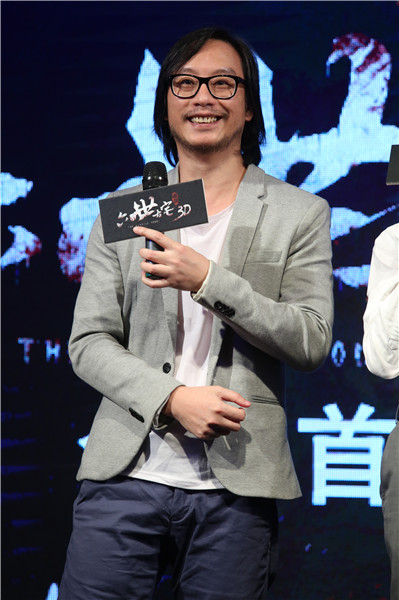 |
|
Danny Pang. [Photo provided to China Daily] |
Hong Kong horror-film director Danny Pang's home's walls are covered with posters featuring ghouls.
And the room hosting his Beijing news conference on July 21 to promote his new thriller, The Strange House, was designed like a horror-flick set with gloomy lighting and spooky sounds. It began with several women in red dresses moving over the stage like floating spirits.
The "king of Hong Kong horror" has returned to the spotlight since the film hit mainland theaters on July 24. It's his first film shot on the mainland and with big-name mainland actors. It's showing on 3-D and 4K DMAX screens on the mainland.
The movie premiered a day before in Malaysia and later will head to overseas destinations, including Thailand, Japan, South Korea and Russia, executive producer Yuan Bingtao says.
"My narrative style relies more on imagery than dialogue," Pang tells China Daily.
"That gives them global appeal beyond language and culture."
The plot centers on a girl who sees ghostly figures and leads to a discovery buried under an old house.
"A thriller director should be like a naughty child ... playing tricks ... and scaring people by surprise," he says.
"Fear stems from reality. Horror scenes featuring everyday things are the best."
Lead actress Xu Jiao, who plays the girl who sees visions, says she became frightened offset during shooting.
"Most of the scenes were shot at night. I had to walk down a dark, narrow alley between the shooting location and my hotel. The four-minute walk was so scary," she says.
The Strange House has been squeezed into a 3.6 percent screening occupancy by summer blockbusters but is wildly popular with horror-flick fans.
Posts on film-review websites praise its pace and atmosphere but express disappointment with its less-than-paranormal ending.
China's film authorities forbid scenes depicting "superstition and heresies", which is widely interpreted as a ban on ghosts.
Last year's horror blockbuster, The House That Never Dies-the highest-grossing homegrown thriller in 50 years-h(huán)as also sparked controversy over its ending.
"Even though China's movie market has opened to all the commercial genres for many years, it's still hard to see excellent thrillers, such as Gone Girl, revolving on modern society," the 2015 Report on Chinese Film Art's thriller chapter concludes.
Pang says the secret is to explore new styles centered on suspense.
|
|
|
|
|
|
|
|
